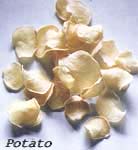 |
 12th July 1998 |
Front Page| |
||||||
 Munch munch munch... mmm.. |
Contents
|
|||||||
 |
Munch munch munch... mmm..A novel experiment in dehydrating fruits and vegetables by the Peradeniya University's Agriculture Faculty could go a long way in preventing crop wastage By Chamintha Thilakarathna and Ayesha Reza Rafiq.Ever tasted dehydrated pineapple ? No, it's not as awful as it sounds. In fact the dark yellow cube tastes quite juicy and pungent- just like the natural fruit- after a few chews. The Faculty of Agriculture of the Peradeniya University has, through years of research, developed simple and successful methods of dehydrating fruit yet maintaining its taste. Dehydrated fruits and vegetables is, they claim, an answer to post harvest wastage of crops. Nearly half of the country's crop is lost in transportation and storage. Any regular visitor to the Pettah market will bear witness to the large amounts of vegetables that go to garbage. Then, there are seasonal fruits which are not even seen at other times. By preserving fruits by dehydrating, it is possible to both reduce crop wastage- by channelling part of the crop to be preserved- and also enjoy a rambutan in December.
Eighteen Foods and Science graduates at the Agriculture Faculty, have been experimenting with this system of dehydration of fruits and vegetables while preserving their taste for several years. Recently they showed the fruits of their research at an exhibition held by the Faculty.
Nelum ala, karawila, papaw, carrots, and even pumpkin, brinjals, leeks, lettuce, cabbages, you name it, they have been successfully dehydrated for future use. What to preserve is just a matter of choice. The fruit or vegetable is first cut small and carefully with a very sharp instrument, so that the tissues are not bruised. Then, depending on the product, minute percentages of chemicals are used. The chemicals are used to preserve the colour and other aspects of the food which might come to harm through the dehydrating process. Once the food is placed in the dehydrator, the products which shrink slightly in the process can be kept for eight months minimum. For most vegetables the addition of water will restore it to normal. They can be cooked and curried just as fresh vegetables. Although people may be prejudiced that such products are unnatural, this is not so. "These products are entirely natural. The world is expecting a food scarcity in the year 2005. Would people rather die or eat dehydrated natural products which are in fact healthier than canned foods or their alternatives," Dr Illeperuma asks. Dehydrated produce is also more convenient as the products are light and small and can even be taken abroad with no fear about them being spoilt or bruised during the journey. Dr. Illeperuma said that the technology is simple and can easily be used in small industries. " It's easy and one can dehydrate about 10 kilos of vegetables per day, of course depending on the item." What's more it's a low cost industry and requires minimum space and equipment. Because of its light weight it is easily transported. By preserving seasonal fruit and vegetables, price fluctuations can be averted. It is important to choose fresh, undamaged fruit and vegetables for dehydration. The cleaning and cutting has to be done very carefully so as not to damage the fruit. Several methods are used to achieve the desired effect. Blanching is one. Another method is submerging the produce in a thick solution of sugar or salt. Still at the very initial stages of product development, the University students hope to share their knowledge with small industrialists to make a profitable and environmentally friendly business. Although this is not the first of such attempts, the University claims that their product retains quality and is best suited in terms of both the food value and practicality for consumers. This is because it guarantees fully nutritious foods which have been preserved in order to reduce waste but which are also consumer friendly due to the lack of artificial ingredients used, except of course in items such as pineapple where in order to obtain a balance in the acids and sugar, a minute percentage of consumer friendly chemicals is used for preservation. But most often the students have used day to day chemicals which are best known, such as salt and vinegar. So, the next time you are in the mood for an off season fruit or vegetable, all you have to do is to take some of these prepared items and re-hydrate them for freshness or just cook or eat them as they are. At present the University has a range of packeted dehydrated, ready to use products and is willing to lend its expertise to those interested in starting such a project.
More Plus * Children of conflict: lost innocence
Front Page| News/Comment| Editorial/Opinion| Business| Sports | Mirror Magazine |
|||||||
 |
Please send your comments and suggestions on this web site to |
|||||||






